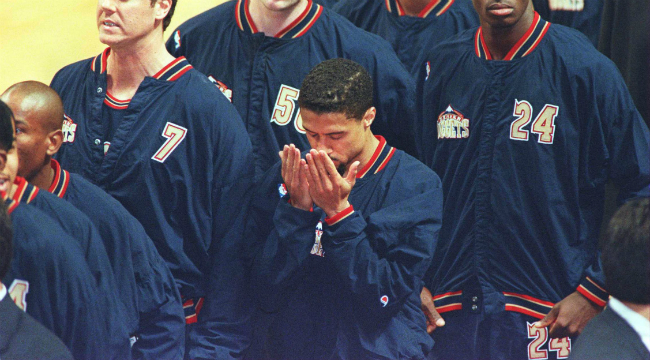
Colin Kaepernick’s sitting protest of the national anthem has ignited a firestorm of controversy in a way that reflects the age of internet. So many people want to publicly bash Kaepernick, no matter how unqualified they may be. It proves just how tough it is to be a person of principle when everyone feels entitled to yell at you for how to observe those principles. Kaepernick isn’t the first person to make a public stand against the national anthem, however; Mahmoud Abdul-Rauf lodged his own protest in the 1996 season, a time when it didn’t gather quite so much attention.
Rauf’s coach at the time, Bernie Bickerstaff, went on Sirius XM NBA radio to discuss his memory of the incident (in which Rauf was made to stand by the NBA but allowed to bow his head in prayer, as you see above), which reveals a lot of how people misunderstand the concept of protest (transcription via Pro Basketball Talk)
“We had him come in, to sit down and have a conversation, and the conversation was about, the one thing that we have in this life is freedom of choice, and with that choice comes consequences. And my conversation with him was simply that one of the guys I probably admired most at that time was Muhammad Ali, because not only did he make a decision not to step forward but it was the part of it, the things that he gave up, and our message basically to [Abdul-Rauf] was ‘Hey, that’s the guy I admire. If you really feel that way then you go home, and you give us a call and let us know you’re willing to walk away from that contract, and then I can really, really, respect that…
“When he got home, we got a call and he said ‘I think I want to be on the trip.’ And that’s our understanding, if you’re on the trip, then you’re standing.”
Although no one will argue that Ali’s protest of the Vietnam War and subsequent ban from boxing was as courageous an act as any we’ve seen from a professional athlete, it’s ridiculous to assume all protest must occur on that level, or that Rauf doing the same thing would accomplish as much. It once again fits the same failure that Kaepernick critics are committing — trying to dictate the terms of someone else’s political expression.
The significance of Ali sitting out was specifically because he was such a high-profile athlete at the time. His absence was felt, and that absence reminded everyone of what he was fighting for. For everyone else, protests are made successful by being visible. To tell an athlete that his only means of protest is to give up his livelihood and retreat from the public forum where his protest is most readily observed is, at best, to conflate him with Ali, and at worst, to maliciously silence him.






